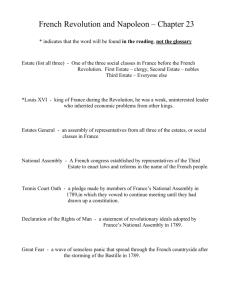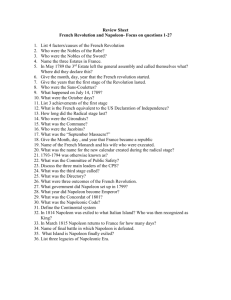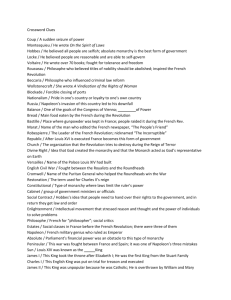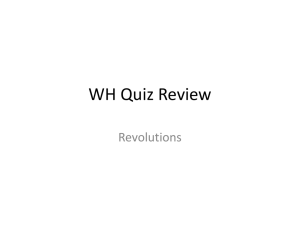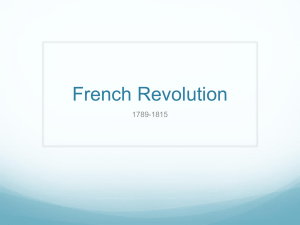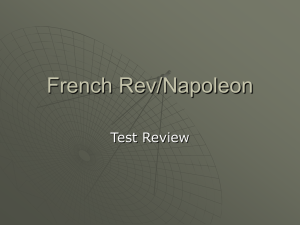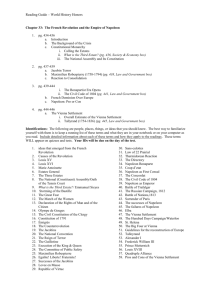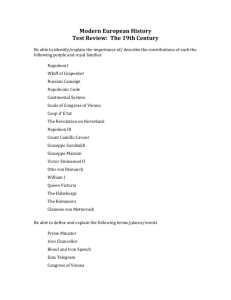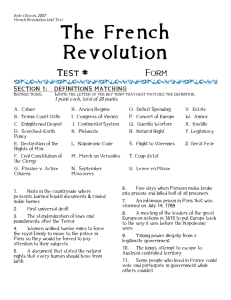NAME - Brookwood High School
advertisement
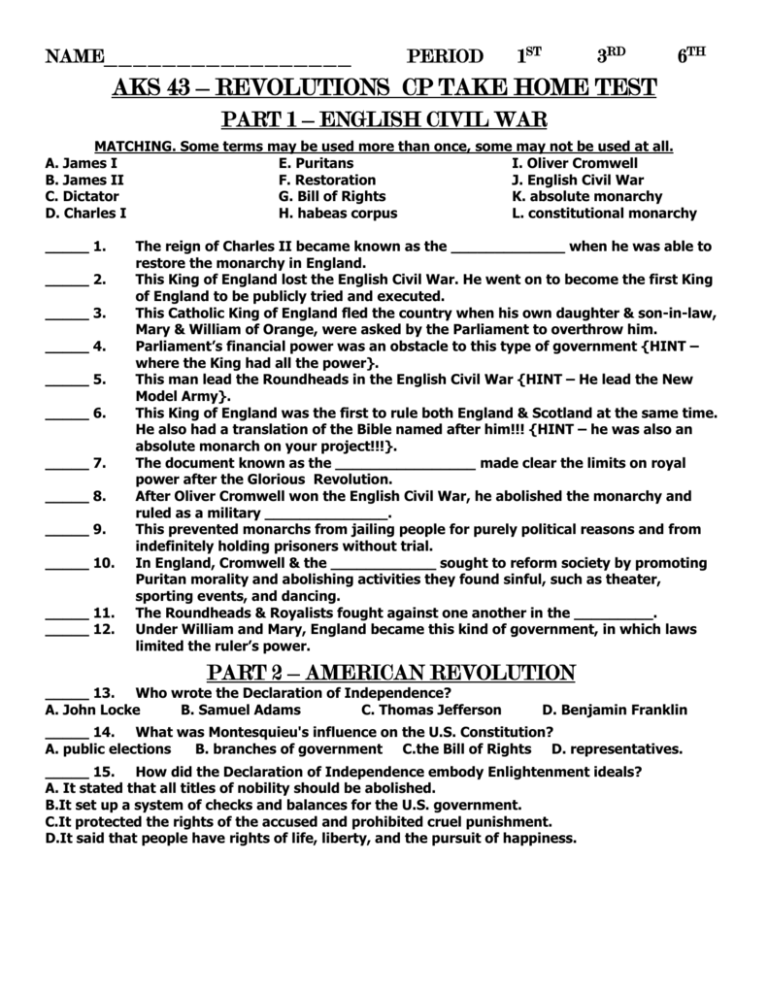
NAME_________________
PERIOD
1ST
3RD
6TH
AKS 43 – REVOLUTIONS CP TAKE HOME TEST
PART 1 – ENGLISH CIVIL WAR
MATCHING. Some terms may be used more than once, some may not be used at all.
A. James I
E. Puritans
I. Oliver Cromwell
B. James II
F. Restoration
J. English Civil War
C. Dictator
G. Bill of Rights
K. absolute monarchy
D. Charles I
H. habeas corpus
L. constitutional monarchy
_____ 1.
_____ 2.
_____ 3.
_____ 4.
_____ 5.
_____ 6.
_____ 7.
_____ 8.
_____ 9.
_____ 10.
_____ 11.
_____ 12.
The reign of Charles II became known as the _____________ when he was able to
restore the monarchy in England.
This King of England lost the English Civil War. He went on to become the first King
of England to be publicly tried and executed.
This Catholic King of England fled the country when his own daughter & son-in-law,
Mary & William of Orange, were asked by the Parliament to overthrow him.
Parliament’s financial power was an obstacle to this type of government {HINT –
where the King had all the power}.
This man lead the Roundheads in the English Civil War {HINT – He lead the New
Model Army}.
This King of England was the first to rule both England & Scotland at the same time.
He also had a translation of the Bible named after him!!! {HINT – he was also an
absolute monarch on your project!!!}.
The document known as the ________________ made clear the limits on royal
power after the Glorious Revolution.
After Oliver Cromwell won the English Civil War, he abolished the monarchy and
ruled as a military ______________.
This prevented monarchs from jailing people for purely political reasons and from
indefinitely holding prisoners without trial.
In England, Cromwell & the ____________ sought to reform society by promoting
Puritan morality and abolishing activities they found sinful, such as theater,
sporting events, and dancing.
The Roundheads & Royalists fought against one another in the _________.
Under William and Mary, England became this kind of government, in which laws
limited the ruler’s power.
PART 2 – AMERICAN REVOLUTION
_____ 13. Who wrote the Declaration of Independence?
A. John Locke
B. Samuel Adams
C. Thomas Jefferson
D. Benjamin Franklin
_____ 14. What was Montesquieu's influence on the U.S. Constitution?
A. public elections
B. branches of government C.the Bill of Rights D. representatives.
_____ 15. How did the Declaration of Independence embody Enlightenment ideals?
A. It stated that all titles of nobility should be abolished.
B.It set up a system of checks and balances for the U.S. government.
C.It protected the rights of the accused and prohibited cruel punishment.
D.It said that people have rights of life, liberty, and the pursuit of happiness.
PART 3 – HAITIAN REVOLUTION
MATCHING. Some terms may be used more than once, some may not be used at all.
A. Haiti
D. Saint Domingue
G. Jean-Jacques Dessalines
B. Caribbean
E. Creole
H. Simon Bolivar
C. France
F. Aficans
I. Enlightenment
_____ 16.
_____ 17.
_____ 18.
_____ 19.
_____ 20.
_____ 21.
_____ 22.
_____ 23.
This was the first Latin American territory to see itself freed from European rule.
What sea is the island of Hispaniola located in?
Nearly 500,000 ______________ worked the French plantations and
outnumbered their masters drastically.
Saint Domingue was a colony of which European Country?
Those living in Haiti speak __________ & French.
When Toussaint L’Ouverture was sent to prison in the French Alps, this man
took up the fight for freedom.
This word means “mountainous land”.
The ideas of the ____________ were a huge inspiration to the enslaved
Africans living on Hispaniola.
KEEP GOING!!! YOU’RE ALMOST DONE!!!!
PART 4 – LATIN AMERICAN REVOLUTIONS
MATCHING. Some terms may be used more than once, some may not be used at all.
A. Peninsulares
C. Mestizos
E. Simon Bolivar
B. Creoles
D. Mulatto
F. Jose San Martin
_____ 24. If you were of African & Spanish descent you were known as a _______________.
_____ 25. If your parents were both born in Spain, and you were born in the Americas, then
you were known as a _______________.
_____ 26. If you were born in Spain, but lived in the Americas, you were known as a _______.
_____ 27. If you were of Indian & Spanish descent you were known as a ______________.
_____ 28. Who were the only people who could hold high office in Spanish colonial
government?
_____ 29. From the view of the colonial powers, the _______ were the most dangerous part of
the population because they were the best educated.
_____ 30. This man was known as the “Libertador”.
_____ 31. This man was the brilliant liberator from Argentine.
PART 5 – FRENCH REVOLUTION
Fill in the following chart:
% of land owned
Estate
1st
2nd
3rd
% of income paid
Who?
% of population
in France
in taxes
32.______________ 33.___% 34.___% 35.___%
36.______________ 37.___% 38.___% 39.___%
40.______________ 41.___% 42.___% 43.___%
MATCHING. Some terms may be used more than once, some may not be used at all.
A. Estates-General
E. Louis XVI
I. Emmanuel-Joseph Sieyès
B. First Estate
F. Marie Antoinette
J. bourgeoisie
C. Second Estate
G. Old Regime
K. Tennis Court Oath
D. Third Estate
H. National Assembly
L. Great Fear
_____ 44.
_____ 45.
_____ 46.
_____ 47.
_____ 48.
_____ 49.
_____ 50.
_____ 51.
The social and political system in use in France in the 1770s, called the ______, had
been in place since the Middle Ages.
This woman was nicknamed “Madame Deficit” because of her excessive spending
and huge gambling losses.
His wife’s excessive spending resulted in forcing King Louis XVI to call the _______
into session for the first time in 175 years.
The ____________, who represented 97 percent of the French population,
Although not a member of the Third Estate, __________ was a spokesman for the
Third Estate. He gave them a fiery speech urging them to form their own Assembly.
After his speech, the Third Estates delegates became known as the ____________
with the responsibility of passing laws and making reforms in the name of the
French people.
When Third Estate delegates were forced to find a new meeting place, they made a
pledge, called the _____________, to continue their meeting until they had drawn
up a new constitution.
Expecting trouble, King Louis XVI called up mercenary troops. This action caused a
rebellion that fueled a widespread emotional reaction from the peasants known as
the ____________.
Multiple Choice.
_____ 52. What happened on July 14, Bastille Day?
A. Robespierre was executed by guillotine.
B. French women marched all the way to Versailles.
C. A mob stormed a prison looking for gunpowder.
D. All of the above are true.
_____ 53.
Which goal was NOT stated in the "slogan of the Revolution"?
A. liberty
B. equality C. justice
D. brotherhood
_____ 54.
Which document stated that "men are born and remain free and equal in rights"?
A. Holy Alliance
C. Declaration of the Rights of Man
B. Declaration of Independence
D. Napoleonic Code
_____ 55.
During the Reign of Terror, who was safe from the guillotine?
A. no one
C. known revolutionaries
B. the nobility
D. only Maximilien Robespierre
PART 6 – NAPOLEON
_____ 56.
What was Napoleon able to accomplish during peacetime?
A. He set up government-run public schools.
B. He set up a comprehensive system of laws.
C. He established a fairer tax code.
D. All of the above are true.
_____ 57.
How did Admiral Nelson win the Battle of Trafalgar?
A. He bombed the French ships with cannonballs.
B. He divided the French fleet and attacked smaller groups of ships.
C. He got help from the Prussians.
D. All of the above are true.
_____ 58.
Why did Napoleon attack Portugal?
A. to force Portugal to trade with France
B. to enforce the terms of the Continental System
C. to prove he was stronger than the Pope
D. All of the above are true.
_____ 59.
Which of the following was NOT a reason for Napoleon to sell the Louisiana
Territory?
A. to raise money
C. to punish the sugar growers in Saint Domingue
B.to cut his losses in America
D. to increase America's power as a British rival
_____ 60.
What was one important consequence of the Battle of Trafalgar?
A. Portugal became part of the French Empire.
B. Napoleon conquered Russia.
C. Napoleon gave up his plans of invading Britain.
D. Napoleon became emperor.
_____ 61.
How did Great Britain react to the Continental System?
A. It invaded France.
B. It organized its own blockade.
C. It negotiated a peace agreement with France.
D. It formed an alliance with Austria and Prussia.
\
PART 7 – THE CONGRESS OF VIENNA
_____ 62.
Which of the following was an important goal of the Congress of Vienna?
A. to destroy France
C. to establish a balance of power in Europe
B. to execute Napoleon by guillotine D. to establish Vienna as the capital of Europe
_____ 63.
Who was the most influential leader at the Congress of Vienna?
A. Czar Alexander I of Russia
C. King Frederick William III of Prussia
B. Emperor Francis I of Austria
D. Prince Klemens von Metternich of Austria
_____ 64.
What was the main goal of the participants in the Congress of Vienna?
A. to create constitutional monarchies in Europe
B. to restore royal families to the thrones of Europe
C. to establish security and stability for the nations of Europe
D. to prevent nations outside Europe from interfering in European affairs
SHORT ANSWER:
This is NOT extra credit!!! This section is worth 5 points on the test, if you don’t do this part, the
highest grade you can possibly get is a 95%. . . . IF EVERYTHING ELSE IS PERFECT. . . .
65. Write a PARAGRAPH about the FINAL DEFEAT of NAPOLEON!!!
_____________________________________________________
_____________________________________________________
_____________________________________________________
_____________________________________________________
_____________________________________________________
_____________________________________________________
_____________________________________________________
_____________________________________________________
_____________________________________________________
